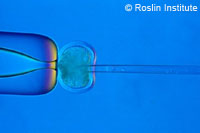Pro-life groups call for rejection of FP7 on ethical grounds
Pro-life groups are asking MEPs to vote against the proposal for the Seventh Framework Programme (FP7) on account of its restricted provisions for funding embryonic stem cell research. The vote will take place in the European Parliament on 15 June. The Parliament's Industry, Research and Energy Committee (ITRE) has already given its opinion on the proposal, and added amendments clarifying which areas will not receive funding for ethical reasons. It is this opinion that will be put to MEPs. Patrick Buckley of the European Life Network told The Catholic Universe newspaper that his group opposes any funding of research 'that would include the destruction of human embryos'. He also highlighted the fact that embryonic stem cell research is illegal in some EU Member States. The Commission has however stated that it would not fund research in a country where it is illegal. Also, each project proposal involving the use of stem cells is subject to a strict ethical review. The European Bishops Conference has also made it clear that it is not satisfied with the current proposal. 'We reiterate our objection to EU-funding of research implying the destruction of human embryos,' reads a statement. 'Such research raises fundamental ethical and anthropological concerns. The Bishops Conference instead advises to EU to 'concentrate its joint research efforts on the many other promising areas of research, also in other kinds of stem cell research, which offer promise'. Under the EU's Sixth Framework Programme (FP6), eight projects involving embryonic stem cell research received funding, in addition to over 100 projects involving adult stem cells.



